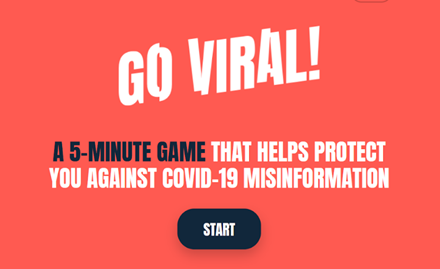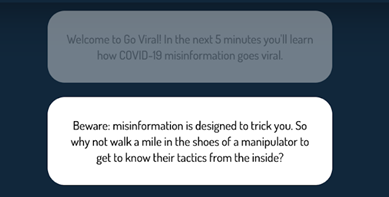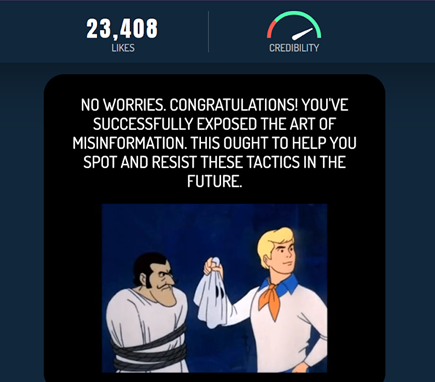Unnuanced communication can damage democracy and cohesion, social scientist Michael Bang Petersen warns. A recent study has indicated that corona-vaccinated people have more prejudices towards non-vaccinated people than the other way around.

19 January 2023
Beware: Misinformation is designed to trick you.
The tone is set in the online game GO VIRAL.
Fortunately, help is near. In five minutes, you can learn how to protect yourself from COVID-19 misinformation, according to the intro of the game. How? Taking the role of a manipulator. Getting to know the disinformation tactics from the inside.
Use strong words and emotional language. Refer to fake experts. Spread wild conspiracy theories. Shame fact-checkers.
"Big Pharma-owned company destroyed PRECIOUS RAINFOREST to fund its MULTI-PLY TOILET PAPER MONOPOLY", it goes in one of the posts you encounter in the game.
Misinformation as a hammer
The purpose of GO VIRAL, developed by the British government and supported by the WHO, is to combat incorrect and misleading information about the coronavirus and the corona vaccines. The narrative is crystal clear. The people who spread misinformation are cynical, and the information they spread is absurd and ridiculous.
But it's not just misinformation that you have to watch out for. It can have unintended negative consequences if authorities and others with substantial reach in the public sphere communicate about misinformation in a way where critical citizens are reduced to tin foil hats and conspiracy theorists.
It's not only about fighting misinformation. It's also about how you do it.

- You should avoid using misinformation as a hammer, Michael Bang Petersen says. He's a professor and social scientist from Aarhus University in Denmark.
As head of the so-called Hope-project he and his colleagues mapped the behavior and attitudes of Danish citizens during the corona pandemic from 2020 to 2022.
An easy explanation
He is among the authors of a study, published in British Nature in the beginning in December 2022.
One of the study's conclusions is that moralizing communication can be an effective strategy to get more people vaccinated. But such methods can also have unintended negative consequences in increasing discrimination and prejudice. Ultimately, it can weaken some citizens' fundamental sense of being part of society and increase distrust of the state and health authorities.
Bang Petersen warns against treating people's choices and behavior too unequivocally.
- It hinders the understanding of others. It becomes an easy explanation where you can say 'well, there we have those silver foil hats and conspiracy theorists who have only read misinformation on social media.'
"Then it's just a matter of them being stupid"
In that way, you deprive people of rationality and remove the rational reasons for the choices they make, says Bang Petersen.
- Then it's just a matter of them being stupid. And it is in any case a narrative that does not motivate the individual to put him or herself in the shoes of others.

He believes the intense focus on misinformation during the pandemic has fed polarization.
- It has been the starting point for people to have ridiculed others, and that perhaps they have felt less need to try to understand what the reasons have been for people, for example, opting out of the vaccine.
He points out that some of the conditions that connect those who have refused the vaccines are not conspiracy theories, but distrust of the health system, which can arise from many situations, and considerations about the balance of risk and benefits for the individual. Therefore, it is too simple in his view to portray the corona debate as a battle between good and evil or clever and stupid.
- The focus on the 'infodemic' creates an explanatory framework that assumes that if you say no [to the vaccines, ed.], it is because you are stupid. Because you are misinformed.
No scientific evidence for an infodemic
But according to Michael Bang Petersen, that explanatory framework does not hold. And there is no research evidence that indicate that we have been exposed to an infodemic.
According to WHO's website, an infodemic is a situation of “too much information including false or misleading information in digital and physical environments during a disease outbreak. It causes confusion and risk-taking behaviours that can harm health."
While there is no doubt of course that the supply of information on corona increased sharply during the pandemic, there is no evidence for the implicit premises of the infodemic: that incorrect information spread like a (virus) epidemic, and that it would have been easier to deal with the pandemic without social media.
- In the experiments that have been carried out to verify whether there has been an infodemic in that sense, it has not been possible to verify it. People began to consume lots of information, but they primarily focused on credible news sources.
Anyone can misinform
In addition, according to Michael Bang Petersen, it is a bad idea to use the word misinformation to characterize something that only "the others" do.

The common definition of misinformation is wrong or misleading information that is spread regardless of whether the sender is aware, whether the information is incorrect or misleading. Misinformation can be spread by accident. It's something everyone can do.
- I think you have to recognize that as authorities or experts, you can end up sharing information that turns out to be misleading or incorrect and thus misinformation, simply because the knowledge base is constantly changing.
The democratic debate
He believes that the democratic debate in some situations has had difficult times during the pandemic.
- In some situations, it has been the case that if, for example, you had concerns about vaccinations, well, then you were a silver foil hat or a conspiracy theorist. There has been a tendency for the vaccine debate to be polarized in many ways.
To Bang Petersen's knowledge, no research has focused solely on the effect of the WHO's and public authorities' communication on democracy and the public debate.
The energy and climate crisis
Right now, the corona pandemic continues to rage in parts of Asia, while in Europe, the worst phase appears to be over.
However, it is not just in relation to the pandemic that problematic dynamics in moralizing communication can arise.
- Right now it is not so clear that this can happen in connection with the energy crisis, because so far it is primarily the individual citizen who pays the costs of wasting electricity and heat, says Michael Bang Petersen.
- But it is obvious that if a situation arises with serious energy shortages that transforms the individual problem to a collective one, then such processes can be set in motion.
And the climate debate has even more potential for this according to the Danish social scientist.
- These dynamics can definitely be triggered in the climate crisis context. There are collective benefits to you acting in a certain way, but there are not individual benefits in the same way. There is only the shaming to resort to to keep people in place on a certain behavior.
And according to Michael Bang Petersen, this can have problematic collateral consequences, just as it has had during the pandemic.
WHO did not want to comment on this article, but refers to its website.
Read more
WHO's online game Go Viral
WHO’s webpage on Go Viral
WHO’s info site on the infodemic
The Hope-project – How Democracies Cope with COVID-19: A Data-Driven Approach”.
Bang Petersen et.al: Transparent communication about negative features of COVID-19 vaccines decreases acceptance but increases trust (PNAS – Proceedings of the National Academy of Sciences of the United States of America)
Bang Petersen: Would we have dealt better with COVID-19 without social media? The idea of an “infodemic” may suggest so. As a social media researcher involved in the covid-response, my answer is a strong “no”. – Twitter thread on the theory of an infodemic 4 DEC 2021.
Altay, S., Kleis Nielsen, R., & Fletcher, R. (2022). Quantifying the “infodemic”: People turned to trustworthy news outlets during the 2020 coronavirus pandemic. Journal of Quantitative Description: Digital Media, 2.